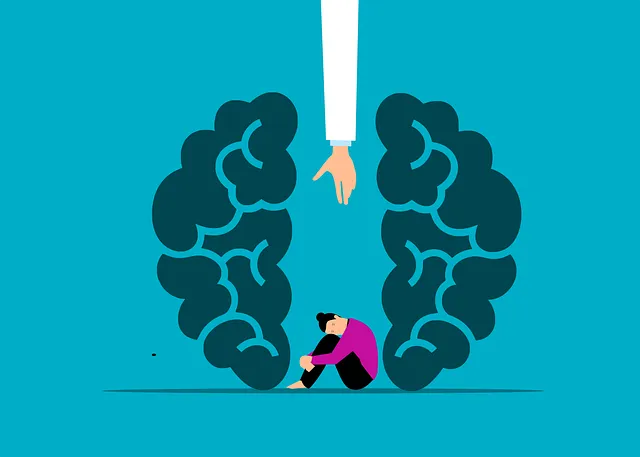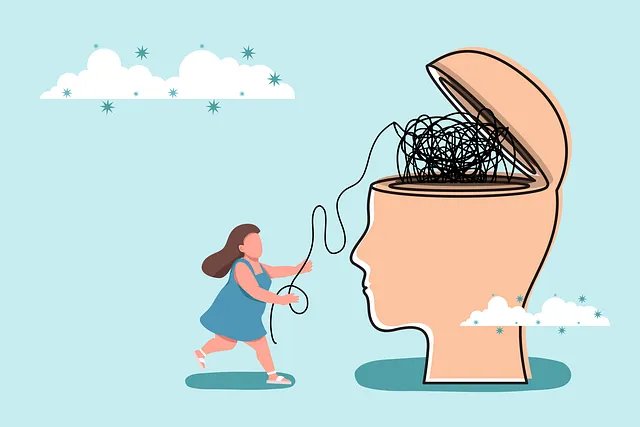The Kaiser Permanente mental health facility in Lafayette promotes mental well-being through a holistic approach emphasizing resilience, flexibility, and mastery (RFM). They offer workshops on stress management, mental wellness journaling, and anxiety relief techniques to help individuals adapt to life's challenges. This integrated model includes burnout prevention strategies for healthcare providers, self-esteem improvement initiatives, and community outreach programs, setting a new standard for resilience building in healthcare delivery. By integrating self-care practices and journaling guidance, the facility provides comprehensive support for mental wellness, revolutionizing depression prevention through RFM exercises tailored to diverse patient needs. Measuring success through data-driven assessments ensures continuous improvement, aligning services with evolving client needs at Kaiser Permanente Lafayette.
“Resilience is a cornerstone of mental well-being, especially in today’s challenging climate. The RFM (Resilience, Flexibility, and Mastery) model offers a structured approach to enhancing resilience, with proven benefits for individuals in mental health care settings. This article explores the implementation of RFM at Kaiser Permanente Lafayette, a leading mental health facility, through integrated resilience programs. We’ll guide you through designing exercises, step-by-step implementation, measuring success, and continuous improvement strategies, providing valuable insights into this transformative process.”
- Understanding RFM and its Significance in Mental Health Care
- Kaiser Permanente Lafayette: A Model for Integrated Resilience Programs
- Designing Effective Resilience Building Exercises
- Implementing RFM at a Mental Health Facility: Step-by-Step Guide
- Measuring Success and Continuous Improvement Strategies
Understanding RFM and its Significance in Mental Health Care

At Kaiser Permanente mental health facility Lafayette, recognizing the interplay between resilience and mental well-being is paramount. RFM (Resilience, Flexibility, and Mastery) models have emerged as powerful tools within the realm of mental health care. These models focus on fostering adaptability to life’s challenges, enhancing coping mechanisms, and promoting a sense of personal control – all crucial elements for maintaining mental wellness. By integrating exercises that target these domains, such as stress management workshops, mental wellness journaling guidance, and anxiety relief techniques, the facility aims to empower individuals with effective strategies to navigate life’s ups and downs.
The implementation of RFM exercises goes beyond mere treatment; it signifies a holistic approach to mental health support. These initiatives not only assist in managing existing conditions but also equip individuals with long-term tools for resilience building. Incorporating such practices within the Kaiser Permanente Lafayette framework underscores a commitment to not just treating symptoms, but nurturing the capacity for personal growth and recovery in an ever-changing world.
Kaiser Permanente Lafayette: A Model for Integrated Resilience Programs

Kaiser Permanente Lafayette stands as a beacon of holistic wellness, offering a model for integrated resilience programs that seamlessly blend mental health services with comprehensive burnout prevention strategies for healthcare providers. Nestled within this mental health facility, innovative initiatives prioritize self-esteem improvement through tailored interventions and community outreach program implementation. By fostering an environment where mental well-being is equated with professional efficacy, Kaiser Permanente Lafayette sets a standard for resilience building exercises, demonstrating the power of integrated approaches in enhancing overall health outcomes. Their success underscores the potential for such programs to revolutionize healthcare delivery by nurturing both the mind and spirit of medical professionals.
Designing Effective Resilience Building Exercises

Resilience building exercises are instrumental in fostering mental wellness, especially within settings like Kaiser Permanente’s mental health facility in Lafayette. Designing effective exercises requires a nuanced approach that caters to individual needs and preferences. A balanced program can incorporate various techniques such as mindfulness practices, emotional regulation strategies, and social skills training. For instance, encouraging patients at the Kaiser Permanente Lafayette mental health facility to keep a Mental Wellness Journal can provide a safe space for self-reflection and tracking personal growth.
Additionally, group activities focused on enhancing social connections and communication skills can significantly contribute to building resilience. These exercises should be adapted to suit different demographics and levels of ability, ensuring inclusivity and accessibility. By integrating Self-Care Practices and Mental Wellness Journaling Exercise Guidance into the routine, the Kaiser Permanente Lafayette facility can offer comprehensive support for its patients’ holistic well-being.
Implementing RFM at a Mental Health Facility: Step-by-Step Guide

Implementing RFM (Resilience, Flexibility, and Mastery) exercises at a Kaiser Permanente mental health facility in Lafayette can be a game-changer in fostering positive thinking and depression prevention among patients. Here’s a step-by-step guide to integrating this effective approach.
First, assess the current environment and identify areas where RFM practices can be introduced. This might involve training staff on the principles of resilience building and its benefits for mental health. Ensuite, tailor activities that cater to different patient needs, ranging from mindfulness workshops to group discussions focused on mastering challenging situations. Encourage participation through engaging sessions that promote positive thinking and reduce the stigma associated with mental illness. Over time, monitor progress by collecting feedback from patients and staff, adjusting the program as needed to ensure its effectiveness in improving resilience and overall well-being.
Measuring Success and Continuous Improvement Strategies

Measuring Success and Continuous Improvement Strategies are paramount when implementing RFM (Recovery-Focused Model) and resilience-building exercises at a mental health facility like Kaiser Permanente in Lafayette. The success of these initiatives can be assessed through various metrics tailored to Depression Prevention and Mood Management goals. Regular evaluations should consider participant engagement, changes in symptoms reported by individuals, and improvements in overall emotional well-being.
Continuous improvement involves regularly reviewing program effectiveness and adapting strategies based on data gathered from these assessments. This iterative process ensures that Risk Management Planning for Mental Health Professionals remains robust and aligned with the evolving needs of clients. By fostering a culture of evidence-based practice, Kaiser Permanente Lafayette can optimize its mental health services, enhancing patient outcomes and promoting resilience in the long term.
The implementation of RFM (Resilience, Flexibility, and Mastery) exercises at Kaiser Permanente Lafayette demonstrates a pioneering approach to mental health care. By integrating these programs into their facilities, they’ve shown significant improvements in patient well-being. This article has provided a comprehensive guide, from understanding the RFM model’s importance to designing effective exercises and measuring success. Adopting similar strategies could revolutionize mental health support at Kaiser Permanente mental health facilities and beyond, fostering resilience and enhancing long-term patient outcomes.






